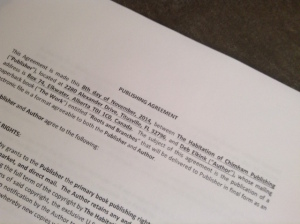I just signed my second book contract! The flush of excitement (fear?) isn’t nearly as overwhelming this time, maybe partly because publishing this book isn’t really a “new venture” but a reworking of graduate research I completed back in 2001.
This is the brief story behind my upcoming book, ROOTS AND BRANCHES: THE SYMBOL OF THE TREE IN THE IMAGINATION OF G. K. CHESTERTON:
When I returned to the classroom, after finishing off home-educating the third child, I found just the scholarly and spiritual nourishment I was looking for. Seminary offered me access to the brilliant minds of godly professors who urged me on towards my goal of clarifying my religious beliefs and rebooting my literary skills so that I could write theologically informed fiction. It worked, though it took me a while. My subsequent novel, The Third Grace, won a Canada-wide, “book of the year”-type of award in 2012 and (besides all sort of editing and other writing-related work) I’ve placed in several short story contests as well. I’ve been busy with drafting my second novel and am on the brink of sending off a proposal for it to attract the agent of my dreams.
So when, a couple of months ago, I received an email out of the blue from a small publishing house interested in my decade-old research on G. K. Chesterton–the late-Victorian apologist, essayist, and novelist–I faltered. The publisher told me how, as a member of the American Chesterton Society, he was reading a novel by GKC that needed explanation–and he found my article online and loved it. Still, I couldn’t quite believe there was a niche audience wanting to read an academic book full of footnotes, but the publisher patiently prodded me, answered my questions, assured me of veto power, raved about the content, and promised me some fantastic endorsements–which he is delivering on.
For example, Dale Ahlquist (whom I repeatedly reference in my research) is one of the Chesterton experts lined up to say nice things about the book, such as:
There are few intellectual exercises more rewarding than the close reading of a Chesterton text. And too few critics have made the effort. . . . Perhaps they are intimidated to offer a critical analysis of a writer who is himself a master literary critic. But Deb Elkink has risen to the challenge.
So I’ve signed and am now immersed in edits and emails and eating/sleeping/dreaming all things Chesterton. And I like it. I’m having fun and learning loads.
Moral of the story: Write with all your heart. You never know who will read your words–or when–and bring them back to you.
But now my novel manuscript is calling me . . .

2 Comments